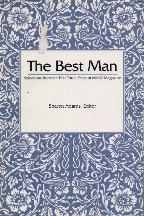I have probably said this in other places in these little “lectures,” but I believe that poetry should be part of my daily life. I do not want to live a life where I live in the prose world for forty hours a week or more and then live in the poetry world for five hours. In this way, I am a religious devotee of poetry. Just like the Devout Christian wants to live like a Christian 24/7, or the Muslim wants to live a life for Allah 24/7, I want to live in the world of metaphor and rhythm and meaning every second of my life. Of course, that is not possible. For one reason, I would starve. The world does not pay you to live in poetry (unless you are one of the very, very rare folks who teaches at a major university and has graders and assistants to do your daily chores while you write poetry). For another, I have to be responsible to my family. Wives and children can be understanding if you have your head in the cloud sometimes, but sooner or later they want you to be present with them, to remember to pick up the dry cleaning and listen to their joys and woes at school or work. Continue reading
Monthly Archives: May 2015
Awaiting Word
You might be the wife of a POW,
who resumed your old routines long ago.
You might be Saul, stone in hand.
You might be the in-mate chewing
the last bite of your favorite meal. Continue reading
The Line and the Sentence, Concerning “Awaiting Word”
“Awaiting Word” is one variety of what is called “the list poem.” I think a poem like this tends to work better as a spoken, oral poem. It doesn’t offer much as a printed poem, because as you read the poem a second or third time, you don’t find many hidden treasures in the way metaphors connect or lines break or allusions grow. On the other hand, a good oral poem, a good poem for poetry readings and such, offers structures that can be readily followed, connections that lead the listener through the poem. An oral poem should not require three or four times of listening to understand it. Continue reading
A Dream of Grace
In the morning, you get the news
your best friend has killed his wife
and you think, “Hey, that’s a thing
I might someday like to try.” Continue reading
The Other Writers Block
1
A student stands in my doorway
confessing some desperate
“blockage in my creative faculties”
and before I can inquire
if she really talks like that
or if she picked it up, like Strep,
by listening too closely to exalted professors Continue reading
The Laying on of Hands
So this is the way it happens. Somewhere around 3:00 a.m. in a bed not made for blood and screams, women hold the woman you love while you haul medical supplies, sterile implements, and oxygen tanks (just in case) from the midwife’s warm Taurus in the driveway. All the while you’re thinking, no, not now, in the morning maybe, the afternoon’s better. You had everything planned: people to pray, a ceremony to honor the seven directions, something to beckon the deer and the wolf. And you were even wise enough to think of the elders. But, now, you forget to light the candles, and far away, the elders are sleeping, cheap paperbacks spread wide like curtains over their exhausted hearts. And the prayer people across town dream of a man falling, tumbling through howling clouds, toward seas heaving at the waning moon. It is at this hour that you return to yourself, and remember what you knew before you knew how to plan, before you began scheduling your epiphanies. It is at this hour that you remember that only empty hands can cup the light, that mercy visits only when the last appointment has ended. So when you are called–If you’re going catch this baby, you better do it now!–there is no other way but to kneel since kneeling is demanded, to bow before the only heaven our body will ever know, to pull life, wet and frightened, into your palms and place him on the altar of his mother’s breasts.
from Feeding the Crow (Plain View Press), and The Road Home (Dalton Publishing).
For my thoughts about writing this poem, follow this link.
Submission, Concerning “The Other Writers Block”
This poem was published in the journal Teaching English in the Two-Year College. It is professional journal that mostly publishes articles about teaching in community colleges. But each issue also contains a poem or two. Continue reading
The Ultimate Contradiction, Concerning “The Laying on of Hands”
For the past hundred and fifty years, as poets stretched the boundaries of the poem, they came to some limits. One of those limits was that the poem is an artifact with rhyme and meter. Well they got rid of rhyme hundreds of years ago with blank verse. Shakespeare did that in some plays. Then they got rid of set meter with Old Testament influenced works like those of Walt Whitman and then finally in the twentieth century with Ezra Pound, William Carlos Williams and Amy Lowell and American free verse. As Pound said, “To break the pentameter, that was the first heave.” But still poetry was in lines, in verses. Continue reading
Following the Thread, Concerning “A Dream of Grace”
The poem “A Dream of Grace” came to me in basically the way you see it here. I was at spending the week at one of Robert Bly’s Great Mother Conferences. Robert Bly is one of the United States best poets. He is perhaps even a better translator. He is one of the people responsible for bringing Neruda, Jimenez, Machado, Rilke, Rumi, Kabir, and so many others to the attention of American intellectuals. These conferences take place in the woods, usually in Church Campgrounds or in conference centers. About one hundred people come and spend the week, take informal classes in all sorts of arts and crafts. At this conference Bly was just finishing his volume called Morning Poems. Continue reading

The Love of a Mentor
My friendship with Bill Owens began thirteen years before I met him. One spring night in 1963 my mother again lost her temper and began whipping me with a leather belt. I was only ten years old, but I knew that this night her whipping would stop. I yanked the belt from her, and she never tried to whip me again. Continue reading
